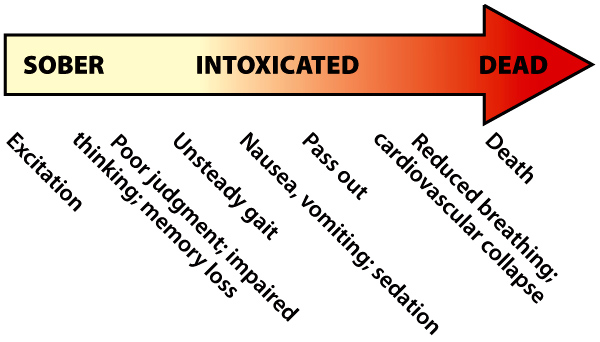Intoxication describes a state of altered physical and mental processes that are produced by substances such as alcohol. The symptoms include physical, behavioral, and mental changes, based on where the alcohol acts in the brain. Some signs of intoxication are listed here:
- Excitability or “disinhibition”—Initially, some people get excitable when they drink alcohol and the normal brakes on inappropriate behavior are “released”. The person talks loudly, laughs inappropriately, and touches inappropriately, etc., “Obnoxious” behavior.
- Loss of judgment—One of the earliest signs of intoxication; loss of judgment may be why some people decide it’s OK to drive after drinking alcohol or why people who do drive misjudge traffic conditions, leading to accidents.
- Cognitive impairment—another early sign of intoxication is that the person has trouble thinking clearly. A danger of this symptom is that it lasts well after someone stops drinking, again a basis for misjudgment during a task such as driving.
- Unsteady gait—Incoordination can lead to imbalance while walking and to other problems that require fine motor control.
- Nausea & vomiting—The alcohol irritates the stomach producing nausea, and eventually vomiting. Vomiting is the body’s protective mechanism to get rid of the alcohol from the stomach before the blood alcohol concentration gets high enough to cause death.
- Loss of memory—drinking episodes, especially binging, lead to a loss of memory of specific events or even entire events during a drinking period (blackout). A blackout does not mean the person “passed out”.
- Sedation—Alcohol can make one feel sleepy, just like a sleeping pill.
- Loss of consciousness—The body protects itself by “passing out” as alcohol reaches high levels in the brain. While passing out doesn’t necessarily lead to death, if the levels of alcohol are high enough in the brain, cardiovascular and respiratory centers in the brain shut down, producing death.
 Figure 2.1 Symptoms of alcohol intoxication occur as one drinks more alcohol and more alcohol reaches the brain.
Figure 2.1 Symptoms of alcohol intoxication occur as one drinks more alcohol and more alcohol reaches the brain.